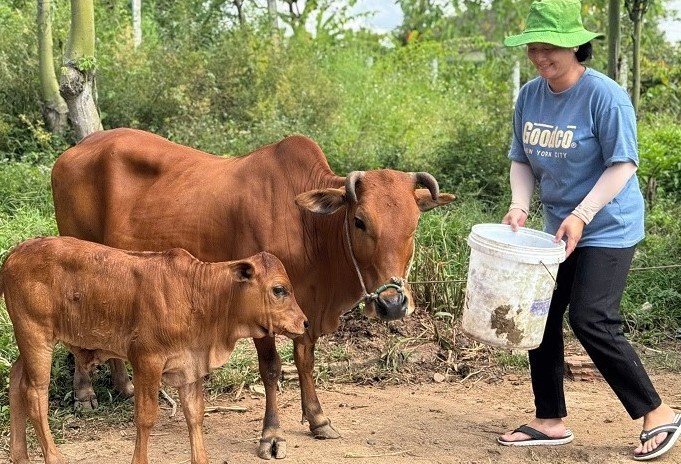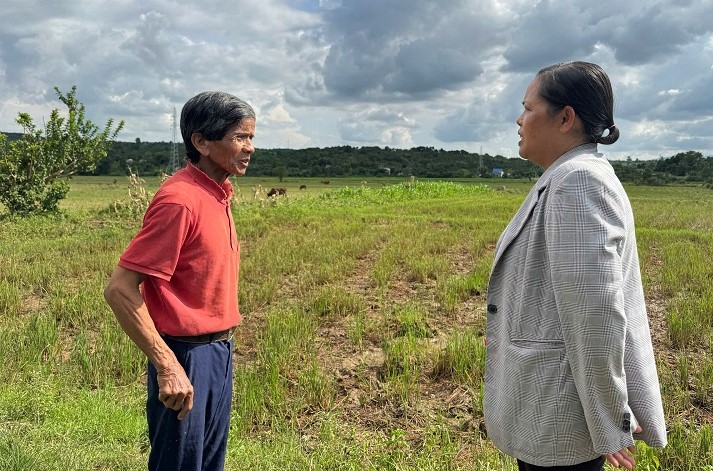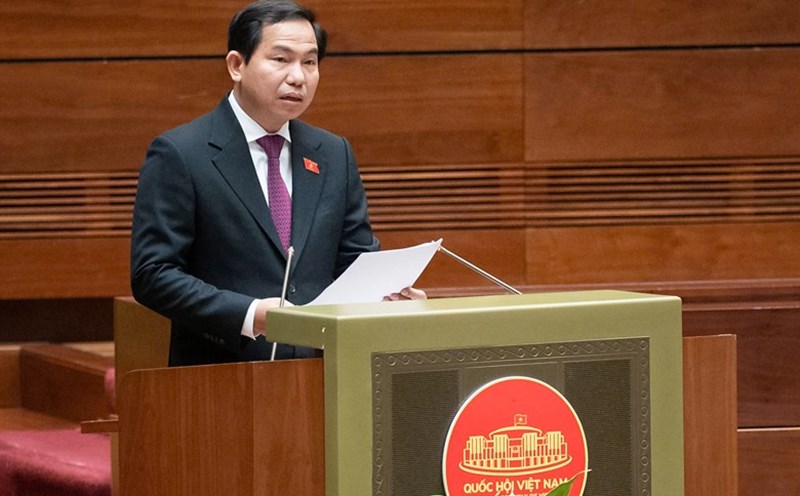Create more livelihoods for the poor
For the past 4 years, the family of Ms. Tran Thi Quynh, residing in Dak Dro commune, has been listed as a near-poor household in the locality.
Quynh's family has 3 children, her husband does not have a stable job, mainly working as a seasonal worker. Quynh shared: "My family's life was extremely difficult before. At the end of 2023, the authorities granted me a breeding cow to develop the family economy."
According to Ms. Quynh, 10 months have passed since receiving the cow for breeding. Currently, Ms. Quynh's family has a one-month-old calf. "When we received the cow, my husband and I saw this as an opportunity to change our lives. If we take good care of the calf, it will grow quickly and be sold for a high price to improve the family's economy," Ms. Quynh added.
According to Ms. Quynh, after receiving the breeding cows, my family's belief in escaping poverty has increased a lot. Ms. Quynh's family feels the great encouragement from the authorities at all levels, not to leave the poor behind. Currently, Ms. Quynh's family is enthusiastically doing business, saving to overcome their circumstances, and soon escape poverty effectively.

Not far from Ms. Quynh's house, Mr. Y Du Drak Eban (51 years old) and his wife are near-poor households. Mr. Y Du Drak Eban is currently living in a dilapidated level 4 house. The couple is middle-aged but has to help each other to get by because their children are not well-off and all work far from home.
Mr. Y Du said: “At the end of 2023, my family will be eligible for State support for a breeding cow. During the day, I take the cow out to the field to graze and take good care of it, hoping that it will soon give birth to its first litter. After that, we will take good care of it, sell the calf to get money to buy supplies, and temporarily repair the house we are living in.”
Not only the above cases, according to statistics of Dak Dro Commune People's Committee, in 2023, the locality disbursed 200 million VND (under sub-project 1, project 3 of the National Target Program on Sustainable Poverty Reduction).
In which, a project on breeding cows was implemented in villages and hamlets for a total of 11 poor and near-poor households.

Creating jobs for the poor to reduce poverty sustainably
As someone who has directly participated in hunger eradication and poverty reduction for many years, Ms. Mai Thi Tho (officer in charge of Labor - Invalids and Social Affairs of Dak Dro commune) confided: "Supporting the development of community production "Raising breeding cows" in Dak Dro commune has contributed to diversifying agricultural production in a sustainable direction".
"The project has created livelihoods and jobs for poor and near-poor households to stabilize and improve their lives, raising the material and spiritual life of the people. Thereby, contributing to promoting the development of the agricultural sector in particular and the socio-economic development of the locality in general" - Ms. Mai Thi Tho added.
Reality shows that, with support from the State budget, Dak Dro commune has successfully donated healthy breeding cows to eligible families.
These are people from poor and near-poor households. These people have difficult circumstances but are determined to improve their lives and have a strong desire to escape poverty.
According to the People's Committee of Dak Dro commune, the locality has seriously implemented the provision of breeding cows. From there, it has created increasingly better conditions in terms of resources to support disadvantaged households to escape poverty.
In addition, at the local level, the movement of joining hands for the poor and leaving no one behind has been responded to and implemented effectively. Thereby, it has actively contributed to rapid and sustainable poverty reduction in the area.
Recently, Dak Dro commune has focused on implementing the program of joining hands for the poor, leaving no one behind. Thereby, actively contributing to the work of rapid and sustainable poverty reduction in the area.
In 2023, the whole commune reduced 10 poor households compared to 2022 (from 98 households to 88 households). Currently, the whole commune still has 184 near-poor households. In 2024, the Commune People's Committee strives to reduce 20 poor households and about 50 near-poor households.












